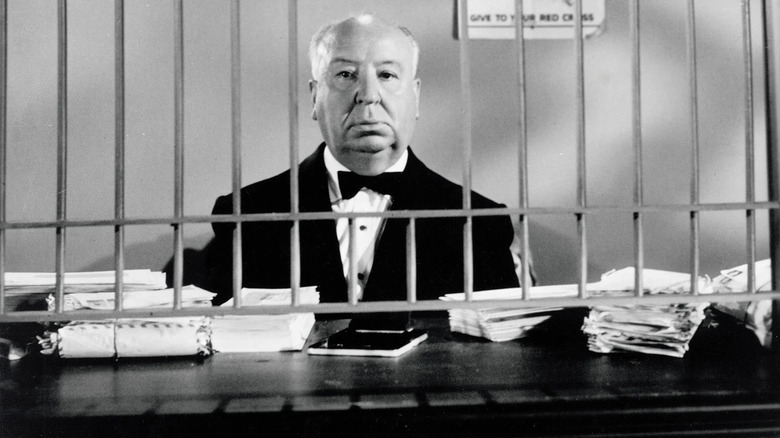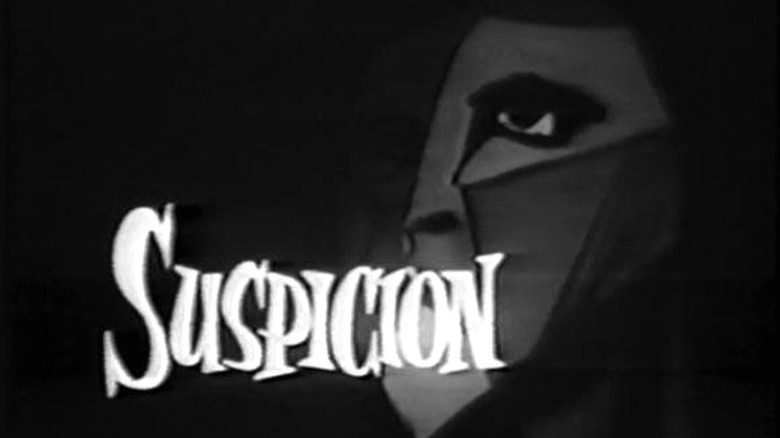Alfred Hitchcock Presents Had A Short-Lived Spinoff Most Fans Likely Missed
When "Alfred Hitchcock Presents" first premiered on CBS in October 1955, the episodic half-hour anthology series immediately gained immense popularity. Hosted by Hitchcock himself, every episode opened with the director's silhouette and Charles Gounod's "Funeral March of a Marionette" playing in the background, which became a cultural landmark in itself. As Hitchcock believed that the show's half-hour format did not do justice to the intricate anthology tales of suspense and terror, the episodic duration was subsequently extended when the show was revamped and retitled to "The Alfred Hitchcock Hour," which ran from 1962 to 1965.
Per John McCarty and Brian Kelleher's "Alfred Hitchcock Presents: An Illustrated Guide to the Ten-year Television Career of the Master of Suspense," NBC (where the show ended up airing alternatively), after witnessing the success of Hitchcock's show, started planning a brand new mystery/suspense anthology that was set to run from 1957 through 1958. This unofficial spin-off was titled "Suspicion," based on Hitchcock's 1941 psychological thriller of the same name starring Cary Grant and Joan Fontaine as the leads. In the end, Hitchcock executive-produced some of the episodes, while the rest was spearheaded by Alan Miller's Revue Productions. However, the show's longevity proved to be short-lived, to the degree that some Hitchcock enthusiasts might not even know that the show ever existed at all.
When NBC started planning "Suspicion," 40 episodes were ordered in advance, with actor/screenwriter Dennis O'Keefe set to host the series. However, although O'Keefe hosted the premiere, he abruptly left the show for undisclosed reasons, and the hosting responsibilities were taken over by stage actor Walter Abel. What exactly had gone wrong?
How a well-planned spin-off fell apart
During the time "Suspicion" was being developed, Joan Harrison was overseeing production for "Alfred Hitchcock Presents" — she was responsible for handling 39 half-hour episodes at the time — and the added burden of handling "Suspicion" proved to be too much for one person. Norman Lloyd was brought in to assist Harrison, but this was not enough to salvage the new series, as it suffered from poor reviews and dwindling ratings throughout its first season.
The show's association with Hitchcock, along with its thematic similarities to "Alfred Hitchcock Presents," did not help boost its popularity. If anything, it suffered due to unfavorable comparisons, as it lacked the unique originality that the half-hour anthology boasted. On top of that, despite Abel's best efforts, his appeal was nowhere near that of Hitchcock's as a host capable of pulling audiences in.
Another reason why the show failed is that anthologies did not survive the competitive market unless they had a strong selling point, such as a beloved host whose presence alone bookended stories that were enriched with compelling context as the episodes started and finished. As anthologies do not have recurring characters that encourage familiarity, everything boils down to the quality of the tales and the appeal of a host who can hold the creative project together. Rod Serling's "The Twilight Zone" is a good example of an anthology series that delivered both on the story front while maintaining consistent brand appeal, as Serling's presence was pivotal to every episode (regardless of its innate artistic value).
While "Suspicion" offered many episodes that were excellently crafted, the series simply couldn't measure up to the show that had inspired its existence in the first place. As a result, "Suspicion" ended after a single season, despite being an admirably put-together suspense anthology that now regrettably remains half-forgotten.

